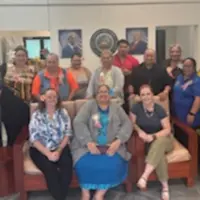
Staff of the Office of Vocational Rehabilitation (OVR), under the leadership of Director Adrian Vasai, recently received training from two officials of the Vocational Rehabilitation Technical Assistance Center for Quality Management (VRTAC-QM).
The center specializes in ensuring that effective and compliant administration of federal funds, dedicated to providing services to American Samoa’s population affected by disabilities, is reliably and unswervingly maintained. Two experts, Dr. Rachel Anderson and Katherine Marchesano, were dispatched by the center—at no cost to OVR—to conduct the training.
The initiativee aligns with the “BRIDGE” Human Resources Development Policy, recently articulated by Governor Pulaali’i Nikolao Pula and Lieutenant Governor Pulumaatala Ae Ae Jr., according to a press release from the Governor’s Office.
Sessions devoted to financial compliance, particularly the timely and accurate preparation and submission of required grant financial reports and adherence to federally permitted charges. These were facilitated by VRTAC-QM’s fiscal expert, Ms. Katherine Marchesano.
Requisite fiscal policies governing the preparation of financial reports and spending eligibility were developed jointly with OVR’s financial staff.
Dr. Rachel Anderson focused on the essential role of the Counselor in instilling service efficacy in the service delivery network. Given the limited funding available, the Counselor’s responsibility to prioritize each client’s service requests becomes critical. The most effective way to alleviate this dilemma is by the development of a realistic Individualized Employment Plan (IPE) for each consumer. Given that OVR’s service domain covers the age range of 14 and older, the diversity of service needs presents a significant challenge in light of finite financial resources. The national policy emphasizing services for the 14-24 age group through the implementation of the Pre-Employment Training Services program further exacerbates OVR’s finances. Nevertheless, Dr. Rachel Anderson outlined and shared strategies to assist the Counselors in navigating these potential service obstacles.
Based on employee feedback, the three days of training sessions were overwhelmingly effective. The employees also expressed support for more future training initiatives.




